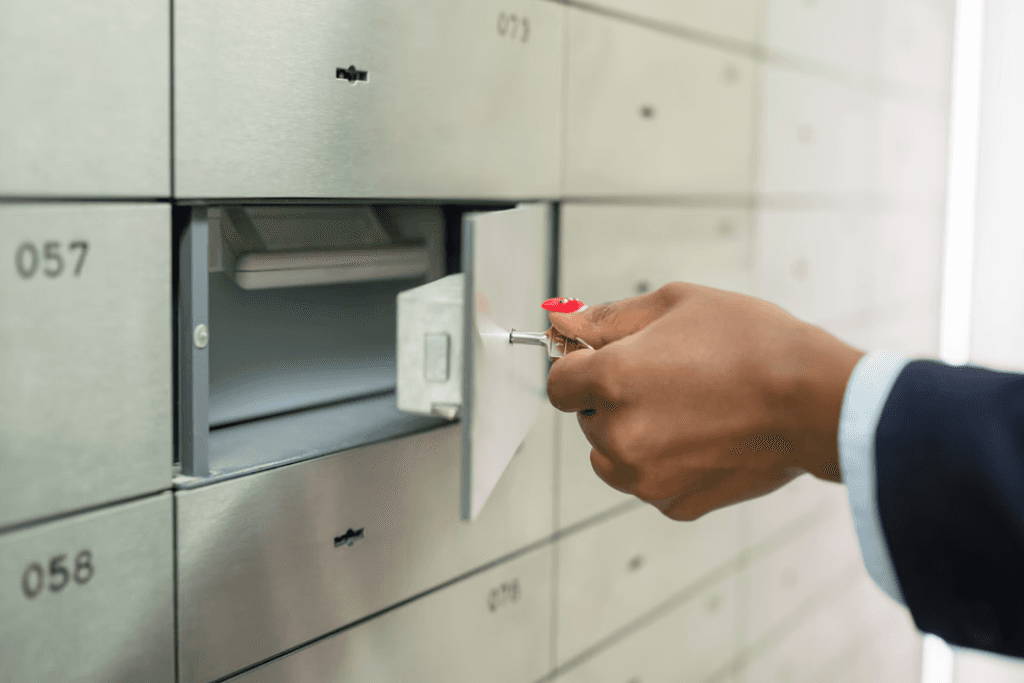Property deeds are essential documents that establish your ownership of a home, and keeping them safe is crucial. By securing your property deeds, you protect both your investment and your peace of mind.
Continue reading for tips on how to organize and securely store your property deeds.
Key Takeaways
Property deeds not only confirm ownership but also play a key role in real estate transactions, legal disputes, and estate planning.
Guard your property deeds against fraud by storing them with Trustworthy, which utilizes advanced security measures like AES 256-bit encryption, multi-factor authentication, biometric authentication, physical security keys, and on-screen redaction.
Importance of Property Deeds in Proving Ownership

Misplacing or damaging your property deeds can lead to significant legal and financial challenges.
When selling your home, you’ll need a valid property deed to prove ownership and avoid delays in the transaction. A missing deed can also open the door to costly legal disputes or even property fraud if it falls into the wrong hands.
Other situations where a valid property deed is essential include:
Refinancing your mortgage: Lenders will require proof of ownership.
Estate planning: Executors will need the property deed to manage or transfer the property.
How to Safely Organize Your Property Deeds
Gather All Related Documents
Start by collecting all documents related to your property, such as insurance policies, renovation records, real estate paperwork, and mortgage documents.
If you've misplaced a property deed, visit your county recorder's office to request a replacement for a fee. Be prepared to provide proof of identification based on your county's requirements.
If you wish to keep physical copies of your property documents, keep them in one safe location. Use binders or folders specifically for your property deeds and related papers. To simplify access, color-code your binders or folders to organize documents into clear subcategories.
Digitize Your Property Deeds
Storing your property deeds and supporting documents digitally adds a layer of protection that physical storage can't match. With Trustworthy, you can easily scan and upload property deeds directly into the Family Operating System® via the Trustworthy mobile app or Ricoh ScanSnap scanners.
The Family Operating System® is designed to meet family-specific organization needs, offering guided workflows and an intuitive interface for storing, accessing, and sharing important documents securely. Trustworthy's Autopilot provides document insights, summaries, and links between related files, making it easy to search and retrieve information quickly.
Best Practices for Physical Storage of Property Deeds

Seth Persily, principal CEO at Elite Litigators, advises: “When it comes to storing property deeds or other important legal documents, security is key. I recommend using fireproof and waterproof safes, especially those that are both UL-rated and resistant to water damage.
"Store the safe in a secure, hidden location in your home — preferably one that is hard to access but still easy for you to retrieve in case of an emergency. Some people also use safe deposit boxes at banks, which offer an added layer of protection against theft or disaster.”
Ensure that family members and trusted individuals, such as financial advisors, know how to access your important documents in case of an emergency. Trustworthy’s Legacy Access feature allows you to grant secure account access to a designated person when needed. For physical storage, make sure to inform your trusted individual about the location and access details.
Avoid leaving important documents in cluttered drawers or unsecured areas like desks or counters. Do not fold or staple them to prevent damage.
For secure, efficient storage, Trustworthy provides advanced security, easy organization, and quick access, complementing both digital and physical storage methods.
Protecting Your Property Deeds From Fraud
David Fleck, a real estate fraud attorney in Southern California, explained to the New York Post why property deed fraud is on the rise: “Twenty-five years ago, it wasn’t easy to forge documents. Now, literally, every computer has the technology to create a believable forgery, and you can buy a fake notary stamp online.
"So the technology has very quickly gotten ahead of the systems we have in place to prevent this.”
Deed fraud occurs through forgery, where criminals fake a homeowner's signature to transfer ownership or deceive homeowners into signing over their deeds with false promises.
Don’t become another statistic. Here are some warning signs:
Unexpected bills or notices for a vacant property.
Receiving unfamiliar documents.
Missing mail.
Receiving foreclosure notices or warnings.
Monitor your property records for any unauthorized changes, and file a “notice of interest” with your county recorder’s office, signaling your ownership. You can also use property monitoring services that provide title or mortgage alerts.
Take protecting homeownership documents one step further with Trustworthy’s advanced bank-level security features, including AES 256-bit encryption, multi-factor authentication, biometric authentication, physical security keys, on-screen redaction, and advanced threat detection that uses user entity behavior analytics monitor for anomalies and unusual activity.
Trustworthy also uses an advanced security system called tokenization. This method replaces sensitive data with unique tokens, storing your information separately from your Trustworthy account and adding an extra level of protection.
When and How to Share Your Property Deeds

When handling real estate transactions or legal matters, you may need to share property deeds with agents, buyers, or lawyers.
Protect your deed by avoiding physical copies and using secure methods like encrypted email. Physical copies can’t be tracked, increasing the risk of unauthorized access.
Trustworthy simplifies secure sharing with its collaboration features, allowing you to build a trusted network of family, attorneys, and other individuals. For those outside your network, use Trustworthy’s SecureLinks™ to create view-only links with controlled access and expiration settings.
Common Mistakes With Property Deeds
Keep your property deeds secure by avoiding these common mistakes:
Failing to keep digital copies: Don’t rely solely on physical storage, which can increase the risk of damaged or missing documents.
Misplacing deeds during moves or renovations: Major life events can easily lead to misplaced documents if you’re not careful, so secure your documents in an off-site location or digitally.
Not informing trusted individuals: Ensure your trusted network knows where your property deeds are stored and how to access them in an emergency.
You can avoid making these mistakes using Trustworthy as your designated storage method for easy access and advanced security. Trustworthy's collaboration features make it easy for your trusted network to access your document.
Frequently Asked Questions
What happens if my property deed is lost or stolen?
The first thing to do is freeze your credit and change the login information for all banking sites and financial services. You must also contact your attorney and start the process of applying for a certified copy.
How can I prove ownership if I lose my property deed?
To get a certified copy of your property deed, you must provide proof of ownership by providing related documents like mortgage records or tax statements.
Can I gift a property deed during my lifetime for estate planning?
Yes, this is called a life estate deed and must meet local laws and tax implications. For example, citizens are allowed to gift up to $13.99 million in money or assets over their lifetime without being subject to federal gift taxes.
We’d love to hear from you! Feel free to email us with any questions, comments, or suggestions for future article topics.
Trustworthy is an online service providing legal forms and information. We are not a law firm and do not provide legal advice.














